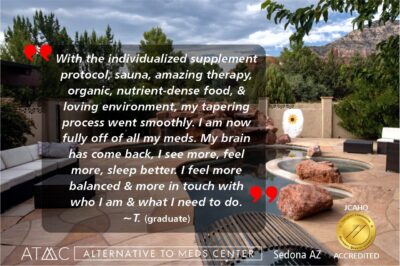Why Choose Alternative to Meds Center for Inpatient Counseling?
The inpatient counseling offered at Alternative to Meds Center is designed to treat the whole unique individual. This approach allows for each person to participate in treatment that is personalized for them and their health journey and goals. Our philosophy of care blends neurotransmitter rehabilitation with other holistic methods to help clients feel good naturally. This can only occur after a thorough individual assessment of each person and then assembling the best treatments for their needs.
A critical focus at ATMC is treatment without medication. For example, accumulated toxins in the body are often overlooked causes of symptoms and can result in misdiagnoses.8 Masking mental health symptoms with medication can cause far more harm than good, not only because it doesn’t provide the healing needed but because it can also create additional physical and mental health symptoms. Therefore, we focus our offerings on holistic adjunctive therapies that do not rely on medication. We believe that treating the whole person and taking a holistic approach to creating treatment plans is what allows our clients to finally address the root of their symptoms.
Inpatient Therapies
The team of mental health providers at Alternative to Meds Center works hard to provide the best care possible to each and every person who crosses our threshold. Their expertise in several therapeutic disciplines allows them to offer a variety of therapies to their patients. Within the inpatient counseling program, we offer multiple different services and therapies.
CBT (Cognitive Behavioral Therapy)
Cognitive behavioral therapy is one of the most widely used “talk” therapies for addiction because research has proven it to be one of the most effective. CBT is especially useful for improving self-efficacy (the confidence that one can control their own behavior) and helping individuals eliminate addiction.9 The aim of cognitive behavioral therapy is to help clients make connections between their thoughts and feelings and how they drive addictive behaviors. Through this understanding, clients can begin to make changes that impact recovery.
Dialectical Behavioral Therapy
Dialectical behavior therapy is based on cognitive behavioral therapy, but shaped to help those individuals who experience extremely intense emotions. Through DBT, clients can learn to understand the relationship between intense negative emotions and harmful behaviors. Instead of engaging in harmful behaviors to mask these emotions, dialectical behavior therapy helps individuals find healthy ways to cope. Research has demonstrated that after engaging in dialectical behavior therapy, individuals were better able to tolerate stress, experienced improved mental health states and self-efficacy, and were less likely to use substances.10
Social Cognitive Theory
The social cognitive theory behind therapy focuses on how behavior can be driven by a number of things, both behavioral and cognitive. This can include environmental factors and the behavior of others in addition to personal experiences and emotions. By exploring the individual more holistically, a therapist can help a client understand that they are not a passive reflection of the things that happen to them and can foresee — and control — the eventual consequences of each behavior. Individuals participating in therapies based on social cognitive theory are not only less likely to experience relapse, they also experience improvements in self-efficacy.11
Choice Theory
Choice theory is the basis for reality therapy. This theory posits that although humans cannot control other people, much about their environment, or how they feel about any of it, they can control the choices they make to deal with each of these aspects. Thus, the best way to avoid negative consequences is to seek ways to control behavior. Choice theory is backed by years of data that states that most people who successfully reach recovery do so because they want to eliminate problems in their life, whether medical, psychological, or social.12
Reality Therapy
Similar to social cognitive theory, reality therapy recognizes that the behavior of human beings is ultimately a choice. Mental health symptoms, as a result, are not necessarily caused by an incurable mental health disorder but by unfulfilled needs. This therapy helps individuals understand that while they cannot control their thoughts or feelings, they can control how they respond to them. Reality therapy has been shown to reduce symptoms of anxiety, depression, and stress in individuals with substance use disorder.13
Structural Family System Therapy
This therapeutic modality is based on structural family system theory, which places an intense focus on the interactions and relationships between family members. Therapists begin by helping family members improve their communication skills. Eventually, the therapist helps the family examine the social structure by which the family operates and make changes to any components that are negatively affecting communication and the overall relationships. With the integration of family system therapy into a treatment plan, clients are more likely to experience favorable treatment outcomes, lasting recovery, and better relationships; this therapy can also help reduce the impact of substance use disorder on family members.14
One-on-One Addiction Counseling
As the name suggests, one-on-one addiction counseling occurs on an individual basis (as opposed to group counseling) and focuses primarily on the factors that surround a person’s addiction. The above-listed therapeutic modalities may be used in addiction counseling depending on the client’s needs, with the intent to identify and address the root contributors to that individual’s relationship with a substance. Addiction counseling can also help the individual develop healthy coping skills to address the elements that drove addiction, and is especially effective when combined with therapies like CBT for co-occurring disorders like PTSD.15
Gestalt Equine-Assisted Therapy
While Gestalt therapy is centered around helping an individual focus on the present rather than dwelling on the past and obsessing over the future, Gestalt equine-assisted therapy takes this approach a step further. With the help of equine animals like horses, clients can explore the feelings that may have been masked by other feelings, worries, or stress. Developing a mutually trust-driven relationship with a horse can help an individual to process these emotions, improve emotional regulation, and even build confidence in their ability to develop mutual trust in their own human relationships.1617
Mindfulness Practices
Similar to Gestalt therapy, the purpose of mindfulness is to help individuals focus on the here and now. The intent is to help focus and accept the thoughts and feelings they are having in the moment and develop healthy ways to address those thoughts and feelings instead of avoiding them with substance use. Mindfulness practices can be put to use after recovery has begun when cravings, triggers, and other stressors occur.18
How Does Inpatient Therapy at Alternative to Meds Center Work?
Each provider works closely with their clients to develop practical strategies to achieve the mental health goals they want to reach. This expertise and attention of our staff providers is what makes Alternative to Meds Center the right choice for inpatient counseling. Our commitment to each unique individual patient makes us stand out among other inpatient treatment centers.
Our Holistic Approach
One of the core pillars of the Alternative to Meds Center treatment techniques and processes is taking a holistic approach to the treatment for the individual. The providers at ATMC take every aspect of the individual into account while creating treatment plans and during the entire recovery process. At ATMC, we help people become the best version of themselves through a journey of self-discovery, lifestyle choices, and new insights. An important aspect of our holistic approach to inpatient counseling and therapy is the rejection of the “Disease Model of Addiction.” The “Disease Model” is the idea that people struggling with addiction have a chronic, permanent brain disease and need to be prescribed medication, either long-term or for life, to change their behavior.7 We reject this idea and instead aim to help our clients heal without toxic medications.
Our Personalized Care and Treatment Plans
As mentioned, one of the most critical components of inpatient counseling is cognitive behavioral therapy. The umbrella of CBT has a variety of different therapies and techniques that can be personalized to fit each person’s needs. For example, for a person struggling with compulsions and/or obsessive behaviors, practicing mindfulness and choice therapy may help them control their negative urges.
That’s why there is no “one size fits all” treatment plan when struggling with mental health and addiction. Here at Alternative to Meds Center, we work to personalize each patient’s care plan to help them become the best version of themselves.

 Inpatient counseling for mental health was developed specifically for individuals attending an inpatient treatment program and struggling with their mental health, whether due to trauma or recovery from addiction or medication usage. The purpose of inpatient counseling is to equip the individual with the tools and coping mechanisms to support them through low points of mental health. Whether the mental health symptoms have occurred due to a traumatic event or recovery from medication toxicity and SUD, counseling can help with the healing process.
Inpatient counseling for mental health was developed specifically for individuals attending an inpatient treatment program and struggling with their mental health, whether due to trauma or recovery from addiction or medication usage. The purpose of inpatient counseling is to equip the individual with the tools and coping mechanisms to support them through low points of mental health. Whether the mental health symptoms have occurred due to a traumatic event or recovery from medication toxicity and SUD, counseling can help with the healing process. We have heard from previous and current clients that seeking out
We have heard from previous and current clients that seeking out 






